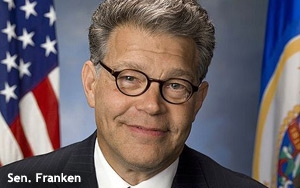Sen. Franken Questions Google About Student Privacy
- by Wendy Davis @wendyndavis, January 13, 2016
 Sen. Al Franken (D-Minn.) has asked Google to provide more information about the type of data it collects from students who use the company's educational apps and Chromebooks.
Sen. Al Franken (D-Minn.) has asked Google to provide more information about the type of data it collects from students who use the company's educational apps and Chromebooks.
"I am concerned about the extent to which Google may be collecting K-12 students' personal data and using that information for non-educational purposes without parents' knowledge or consent," the lawmaker says in a letter sent to the company on Wednesday.
He is asking Google to specify what type of data it collects from students who are signed in to a Google Apps for Education account, but not using an education service. Franken also is asking the company whether it collects and uses browsing data from students who are using Chromebooks to access non-education services like YouTube, Google News and Blogger.
"I am concerned that this collection of data may enable Google to create detailed profiles of the students and ultimately target advertising to them or use the profiles for other non-educational purposes without the students' knowledge," he writes.
Franken's letter comes around six weeks after the digital rights group Electronic Frontier Foundation alleged in a Federal Trade Commission complaint that Google violates a "student privacy pledge" by collecting data from students. The EFF specifically said that Google gathers data from Chromebooks, and from students logged in to Google for Education accounts, even when students use the Web for non-academic purposes.
The "student privacy pledge," which was developed by the think tank Future of Privacy Forum and has been signed by more than 200 companies, prohibits school service providers from collecting any data from students except for authorized educational purposes, or as permitted by parents and students; the pledge also requires companies to destroy students' personal data after it's no longer needed for authorized purposes.
The pledge defines "school service providers" as companies that operate services designed for elementary and secondary schools. But the definition also specifically excludes companies acting as providers of non-educational software and apps.
Jules Polonetsky, executive director of the Future of Privacy Forum, previously said the EFF's complaint doesn't have merit. "We don't believe the complaint raises any issues about data use that are restricted by the Student Privacy Pledge," he stated last month.
Franken has asked Google to respond to his questions by Feb. 12.


